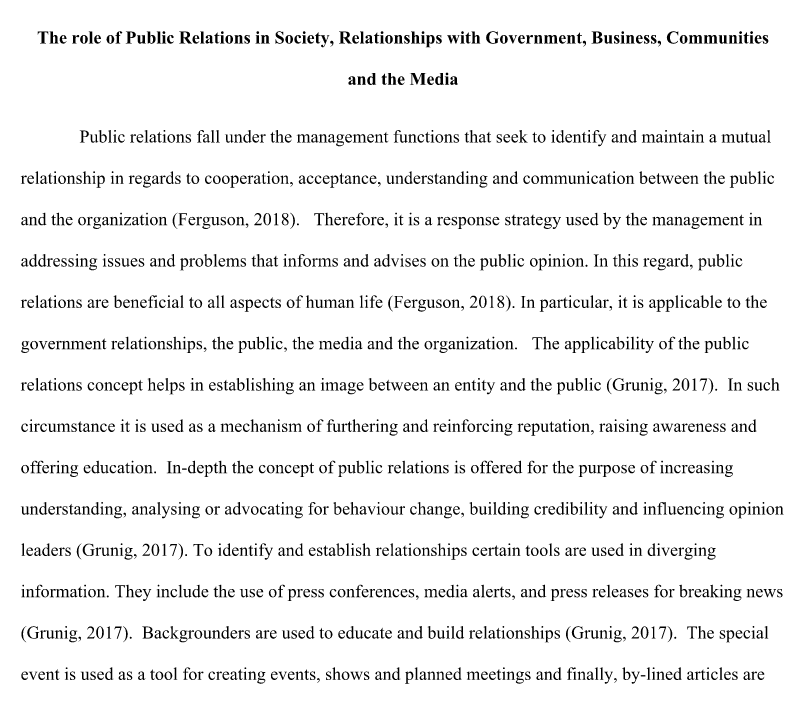Dissertation
Question Description
Write an academic paper (3,000 words, ± 10% deviation is tolerated) in relation to contemporary issues in public relations and public communications theory and practice, suitable for presentation at an academic conference. You should choose your own topic and theoretical approach. It is recommended to use one of the theories discussed during the lectures. You are expected to demonstrate your advanced knowledge and critical understanding of theoretical frameworks, paradigms, approaches, principles and concepts that inform public relations and public communication, critically evaluate and empirically verify them through the appropriate application of research methods. The paper should also demonstrate your understanding of epistemologies underpinning research paradigms and their influence upon public relations and public communications knowledge and theory development. The emphasis of this assignment is on your understanding of theoretical paradigms and concepts and application of your knowledge to the systematic empirical analysis of current public relations and public communication phenomena, challenges, issues and their societal implications.
You will be required to present your assignment at MSc Public Relations conference on Tuesday, 27 November 2018. Your presentation, representing 10% of your mark, will be placed in a panel and scheduled according to your topic.
You must upload your draft abstract of the paper (200-250 words) outlining the purpose of your paper, theoretical framework, the central thesis/research questions, methodology, and expected implications to Canvas (under PREPP62 – Assessment – Paper abstract) by Wednesday, 7 November 2018 by noon. Please look at the abstracts in academic journal articles to gain an understanding of how the abstract should be written.
You will receive feedback and recommendationsfor directions of your paper and will be allocated into a panel for your presentation. The abstract will not be marked nor will it count towards your final mark.
Failure to submit the abstract on time will result in losing an opportunity to present your work at the conference on 27 November 2018.
The presentation of your assignment should be 10 minutes long, allowing 5 additional minutes for questions and feedback. In your presentation, you are expected to introduce the main ideas of the paper (e.g. focus and scope, theoretical framework, theoretical applications, epistemological and methodological approach, examples, cases under consideration, preliminary findings etc.). Your presentation represents an opportunity to receive feedback, on the basis of which you can improve and fine-tune your assignment prior to the final submission.
Ethical approval process:
Since this paper includes primary research, you must obtain University of Stirling's ethical approval before you start with your data collection. You should not commence your research until you have been notified that your project is approved. More information on University Research Ethics can be found here with detailed guidelines for requesting ethical approval, including the forms and templates here.
You need to download and fill in the GUEP Student Research Project Ethical Approval (for undergraduate and postgraduate taught students) form which can be found here as soon as you decide about your methodological approach. You need to send the form to the module coordinator Dr AlenkaJelen-Sanchez (alenka.jelen@stir.ac.uk) for approval. Once the reform is signed by your module coordinator and returned to you, you must upload it on Canvas (Assignments – Ethics Submission) no later than 12 November 2018 by noon. Please do not email the form to the FAH ethics committee, but follow the procedure described above (the procedure has changed this academic year and the central forms have not yet been updated). Students who will be doing surveys, interviews, focus groups or other forms of research involving live participants are requested to prepare a Participant Information Sheet (UG and PGTs) and a Participant Consent Form (follow the links for the generic templates). These need to be submitted with the GUEP Student Research Project Ethical Approval Form to the module coordinator and subsequently uploaded on Canvas.
Preparation and Sources
It is advisable to use a broad spread of sources to build your framework of understanding AND analysis. Your search for information will include academic journals and books, but may alsoinclude academic studies, business periodicals and newspapers. Critically evaluate these sources while using them to support your statements and arguments. You are expected to draw from a variety of reliable sources (at least 15, a minimum of 7 sources must be academic journal articles), which must be relevant and functional in the text. An ethical understanding of the research process begins with a clear undertaking to credit sources and use of an appropriate referencing style and in-text referencing. Ensure that you use APA 6th edition referencing style correctly. Your reference list should contain only details of the sources you mention in your work.
Guidelines and Assessment
Your assignment requires a logical structure and is recommended to include:
 Australia
Australia United Kingdom
United Kingdom UAE
UAE

